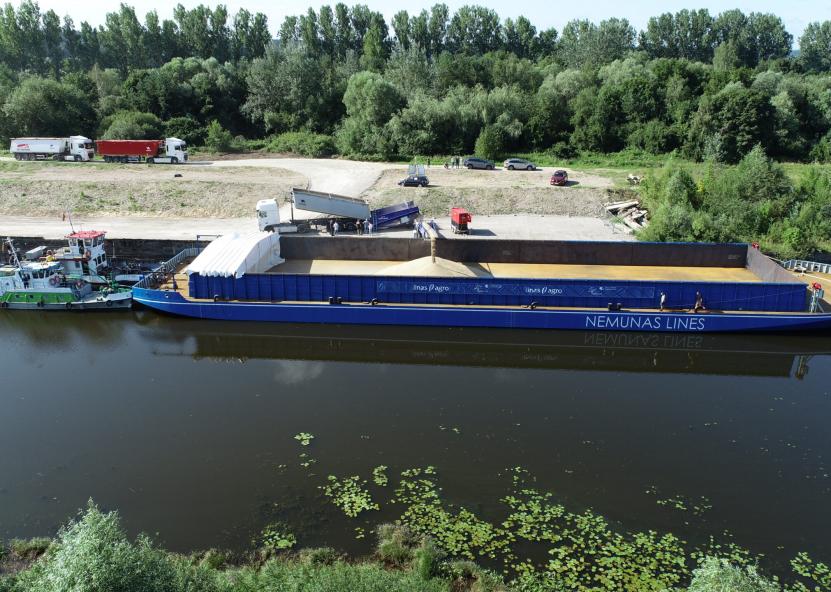Grain reaches the port of Klaipėda on the Nemunas for the first time
On Thursday, the first barge carrying a cargo of Lithuanian grain for export arrived at Klaipėda Seaport on the Nemunas. The Port Authority plans to make such regular grain shipments from Jurbarkas to Klaipėda on a regular basis, with the help of two ships carrying 1,300 tonnes of grain each.
„This grain is the start of a new project. We understand that it will be a certain amount, 50,000, 60,000 tonnes of grain, which will be brought to Klaipėda by barge. This is a new stage, this is a project that allows us to think that in the future inland waters will be used more and more for the transportation of cargo from that part of Lithuania to Klaipėda“, – Algis Latakas, Director General of the Klaipėda Port Authority, told journalists in Klaipėda on Thursday.
„We can bring a large part of the cargo in one go, by waterway to the port, where further on the cargo can be transhipped to bigger ships and those ships can be sailed to the country where the cargo has to be sent,– he said.
The port authority calculates that a single voyage on the Nemunas will carry about the same amount of grain as 40–54 trucks, which should reduce the amount of truck traffic on the roads and streets of Klaipeda.
Vladimir Vinokurov, head of the Inland Waterways Directorate, said the 1,000-tonne cargo of grain from Jurbarkas to Klaipėda took about 16 hours, but in future the barges could reach the port in about 13 hours, even at night.
He said the waterway on the Nemunas is suitable for such cargoes with the construction of 553 barges on the river, but it will be fully cleared in a few years.
„The booms are working faster than planned, but it will still take a couple more years to fully clear the waterway. Then we still need to clean the debris at the Russian border (...) and we will get to the parameters that are suitable for this road and then we can load at full capacity," V. Vinokurov told reporters.
The grain from the port will be transhipped by the Klaipėda Sea Freight Company „Bega“ to high-tonnage vessels. Laimonas Rimkus, the company's CEO, said that the company has been loading grain from barges for twelve years, so it will not need to make any additional preparations.„This is a typical method of unloading and is not complicated. The only thing that matters is that the barge has its own schedule," Rimkus told reporters.
L. Rimkus said the company can unload 1,000 tonnes of grain in about an hour.
He told reporters that the company aims to ship about 30,000 tonnes of grain via the Nemunas River every year.
For his part, Latak said that in the future, the waterway could be extended to Jonava, so that fertiliser cargoes could also be transported from the city to Klaipėda.
In the past, Latakas said, gravel was transported from Jurbarkas by barges, and in recent years oversized cargo and containers have been transported along the Nemunas, but such journeys have not been a regular occurrence.









































































































